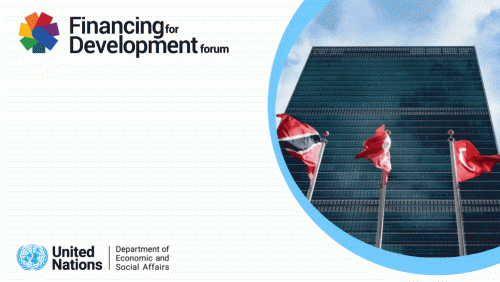
https://financing.desa.un.org/what-we-do/ECOSOC/financing-development-fo...
At the midpoint of implementation of the Sustainable Development Goals (SDGs), more than half of the SDG targets have seen weak or insufficient progress while nearly a third are stalled or reversing. Development finance is more needed than ever amid conflicts, humanitarian disasters, extreme weather events and economic upheavals.
At the United Nations, governments have set goals and targets for financing sustainable development, notably the Addis Ababa Action Agenda adopted in 2015, which provides a new global framework for financing sustainable development.
Please note that if you are unable to attend the Forum, the Forum will also be livestreamed on UN Web TV.
For any questions, please contact the Financing for Sustainable Development Office at ffdforum@un.org.
22 April 2024Economic Development
https://news.un.org/en/story/2024/04/1148836
The UN Secretary-General on Monday called for a “surge in investment” to give developing countries a chance to build better lives for their people.
According to UN estimates, the world is facing an annual financing gap of about $4 trillion to achieve sustainable development, leaving countries with hardly any resources to invest in better education, healthcare, renewable energy or social protection.
“The Sustainable Development Goals (SDGs) are hanging by a thread, and with them, the hopes and dreams of billions of people around the world,” António Guterres said, addressing the UN Economic and Social Council’s (ECOSOC) 2024 Forum on Financing for Development.
In particular, the UN chief urged countries to push for the SDG Stimulus of $500 billion annually in affordable long-term finance for developing countries, which he proposed in February 2023.
Recalling that the Stimulus was welcomed by world leaders at the SDG Summit last year, he stressed “now it’s time to move from words to action and deliver affordable, long-term financing at scale.”
Reform global financial architecture
In his remarks, the Secretary-General also called for greater representation of developing countries in global financial systems.
“The countries who need these systems and institutions most were not present at their creation – a lack of representation that continues to this day,” he said, underlining the urgent need for change.
In that context, he highlighted the Summit of the Future, which will be convened on 22 and 23 September in New York, and the 2025 Financing for Development Conference in Spain as “key opportunities” to gather world leaders to reform the global financial architecture.
“Let’s make the most of these opportunities. Now is the time for ambition. Now is the time for reform,” Mr. Guterres urged UN Member States.
“Now is the time to shape a global economic and financial system that delivers for people and planet,” he said.
We must work together
Paula Narváez, the ECOSOC President, also highlighted the need for the international financial architecture to channel sufficient resources towards the most vulnerable economies in the world.
Stressing the need to confront dated paradigms and to renew cooperation among nations to implement the 2030 Agenda for Sustainable Development, she reminded delegates that the task at hand “is not an easy one”.
“We must work together, and we must unite all of our political capital and determination to address these challenges,” she said, noting the urgent needs of least developed countries and other low-income countries.
She also called for ways to effectively coordinate public and private creditors and ensure that commercial creditors fulfil their obligations as well as “significantly increasing” concessional financing.
Focus on debt crisis
Also addressing the Forum, Dennis Francis, President of the UN General Assembly, called for a “relentless focus” on the debt crisis.
In 2023, the global public debt reached a staggering $313 trillion and over the last decade, increasing far more rapidly in developing nations than in developed ones.
"Worse, developing countries are paying twice as much in interest on their total sovereign debt stocks than developed nations, hobbling them further as they try to ascend the development ladder,” Mr. Francis said, noting that over 100 countries have been forced to choose between servicing their debt or invest in development.
“All the while, nearly half of humanity – or 3.3 billion people – live in countries that spend more on interest payments than on education or health...No nation – I repeat, no nation – should be forced to gamble with their future,” he stressed.
He recalled the General Assembly’s first-ever Sustainability Week, which concluded on Friday.
“As participants made clear, countries must be enabled to channel their resources towards uplifting their communities and building resilience rather than servicing excessive debt,” Mr. Francis noted.










